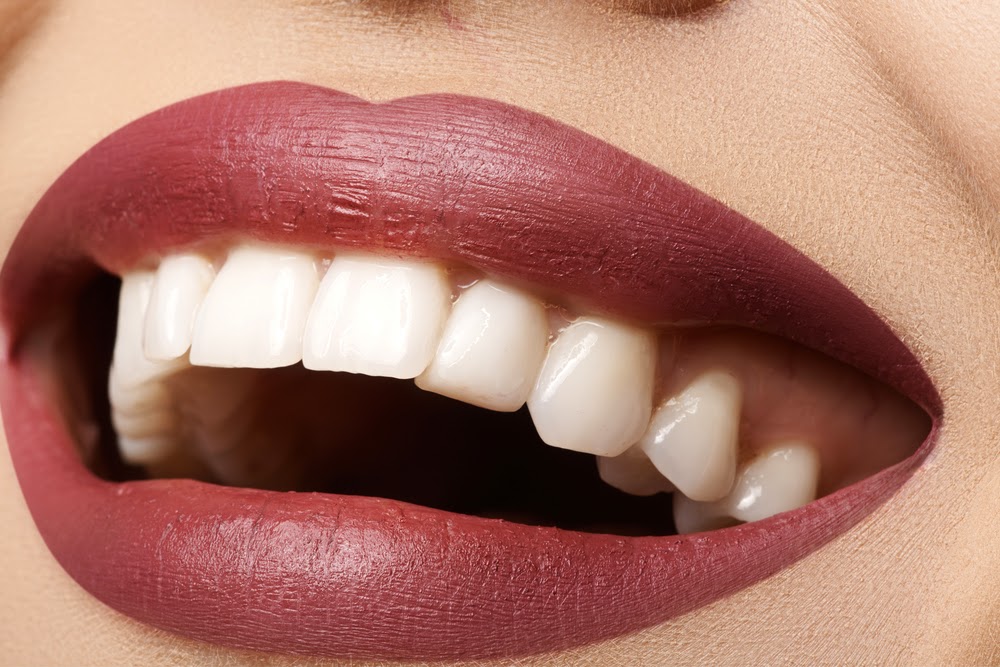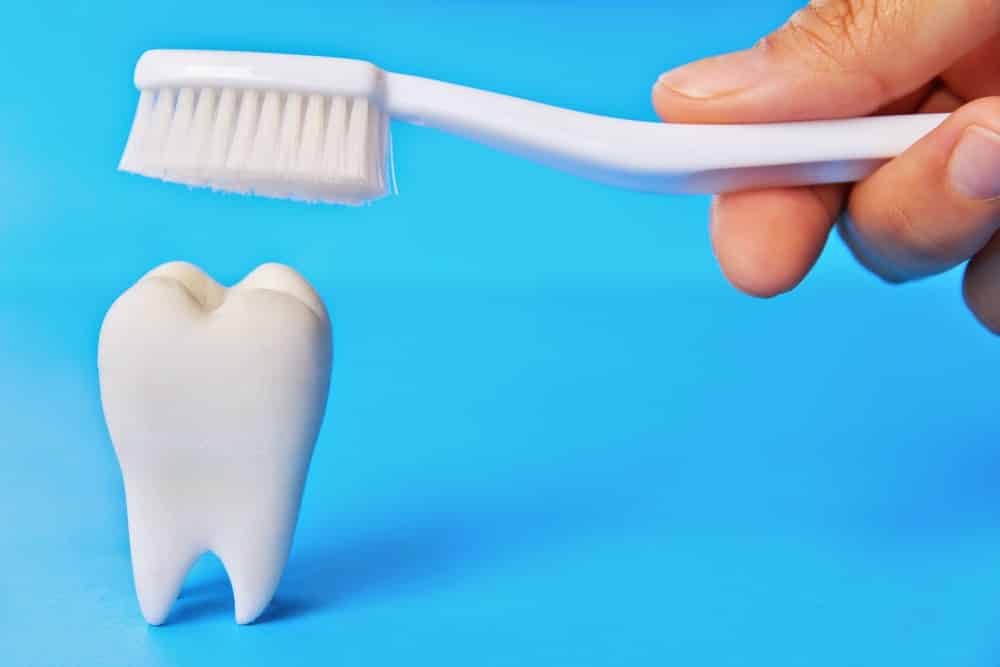Hopefully, you know by now that brushing and flossing your teeth, as well as visiting your dentist at least once every six months for an exam and cleaning, are the main tenets of what you should do to keep your mouth healthy. However, good dental health is as much about what you don’t do as it is what you do. To help make sure that you’re making the most of a good dental hygiene routine, we explain a few important do’s and don’ts in proper dental health management.
DO—Brush your teeth at least twice a day and floss at least once to help control plaque buildup, which contains bacteria that can damage your teeth and gums.
DON’T—Scrub too harshly, as you may be tempted to do if your teeth are especially grimy. Unlike a marble countertop, scrubbing harshly does not clean your teeth better. On the contrary, you may end up rubbing your teeth enamel clean off of your teeth, leaving them more vulnerable to bacteria and decay.
DO—Visit your dentist at least once every six months for a comprehensive dental checkup and cleaning. Your visits should occur sooner if you are at an increased risk of dental issues, or if you’ve recently undergone dental treatment.
DON’T—neglect to visit your dentist just because you feel like your hygiene is superb, or because your teeth appear squeaky clean and healthy. Tooth decay and gum disease do not always exhibit noticeable signs when they first develop. Detecting them early often depends on a strict adherence to your dental checkup schedule.
DO—refrain from snacking excessively on sugary products to help reduce your risk of cavities.
DON’T—fall into a false sense of security simply because you’ve cut candy from your diet. The germs that convert sugar into tooth-eroding acid convert other fermentable carbohydrates, as well.
Dr. Quinn Smith is a well-respected and highly experienced general, restorative, and family dentist in Grand Prairie, TX. He takes a patient-first approach that starts from the moment patients enter our Pecan Tree Dental office, and he offers a three-year guarantee on all dental work that he performs. Whether you and your family are new or returning patients, you can schedule a consultation or your next appointment with Dr. Smith by contacting us at (972) 262-5111.
What Is Tooth Decay?
Tooth decay occurs when plaque is allowed to buildup and cling to the tooth enamel. If plaque is not removed, it can combine with bacteria found in your mouth, forming acids that erode the enamel. Over time, the enamel becomes weak and a hole, or cavity, develops. Once a cavity forms, the layer underneath the enamel (dentin) becomes exposed and is susceptible to the spread of further decay. When bacteria are allowed access to the interior of your tooth, professional treatment may be necessary.
What Causes Teeth to Decay?
A common cause of tooth decay is lack of proper dental hygiene. If you don’t brush or floss your teeth, plaque and bacteria are not removed and remain on your teeth until damage is prevalent. Foods or drinks that are high in sugar and carbohydrates can lead to decay, as these fuel bacteria within the mouth. If you suffer from dry mouth, you may experience a lack in saliva. This can be harmful as saliva cleans the teeth by washing away food particles and bacteria within the mouth.
How to Stop Tooth Decay in its Tracks
Tooth decay is not something you have to live with forever. Minor cases can be prevented through regular dental hygiene, along with dental checkups and cleanings. A dental filling may be necessary if a cavity has formed and affects the dentin. If the center, or pulp, of your tooth becomes infected, then a root canal treatment will be needed to rid the tooth of any infected tissue. If a tooth is severely damaged, then it may need to be extracted and replaced with a dental bridge or implant.
ABOUT YOUR GRAND PRAIRIE RESTORATIVE DENTIST:
Dr. Quinn Smith is a well-respected and highly experienced general, restorative, and family dentist in Grand Prairie, TX. He takes a patient-first approach that starts from the moment patients enter our Pecan Tree Dental office, and he offers a three-year guarantee on all dental work that he performs. Whether you and your family are new or returning patients, you can schedule a consultation or your next appointment with Dr. Smith by contacting us at (972) 262-5111.
Is Gum Disease Present? Learn How to Treat It
For a large majority of people, gum disease is, or someday will be, a significant threat to their oral health. However, with consistently good hygiene and professional care, it doesn’t have to be a destructive influence. Gum disease is a progressive issue that, while common, is also highly preventable, and highly treatable if it is allowed to develop. While prevention is typically the same (daily brushing and flossing, along with routine checkups and cleanings), the secret of how to treat gum disease depends on how severe your condition is allowed to become.
Understanding What Gum Disease Is
Gum disease, also called periodontal disease, can actually affect much more than just your gums when it’s allowed to have its way. Beginning as a bacterial infection (gingivitis) that results from an overabundance of plaque buildup, gum disease slowly progresses until it destroys your gum tissues and the ligaments around your teeth. Eventually, it can reach the jawbone underneath your gums, eroding the bone around your teeth roots and potentially leading to tooth loss.
Treating Gum Disease in Stages
Since the first stage of gum disease, gingivitis, is actually a bacterial infection, treating it can often be accomplished by simply cleaning away the bacteria from underneath your gum tissues. The procedure, which is referred to as a deep cleaning (root planing and scaling) involves carefully cleaning the surfaces of your teeth roots to allow the gums to recuperate. If your gum tissue is severely infected, it might need to be trimmed away, and possibly replaced with a gum graft.
ABOUT YOUR GRAND PRAIRIE DENTIST:
Dr. Quinn Smith is a well-respected and highly experienced general, restorative, and family dentist in Grand Prairie, TX. He takes a patient-first approach that starts from the moment patients enter our Pecan Tree Dental office, and he offers a three-year guarantee on all dental work that he performs. Whether you and your family are new or returning patients, you can schedule a consultation or your next appointment with Dr. Smith by contacting us at (972) 262-5111.
How Teeth Whitening Can Improve Your Smile
Throughout your life, you may notice that some things begin to fade; memories, hobbies, interests, and even the color of your teeth. When the outer layer of a tooth (enamel) changes in color, it is known as extrinsic staining, and can typically be resolved with a minimally invasive cosmetic treatment. If staining goes beyond the tooth enamel and affects the layer underneath (dentin), it is known as intrinsic discoloration. This eliminates the possibility of a simple teeth whitening procedure, and further examination will be necessary.
How Teeth Stain
From the foods you eat, to the environment you live in, your teeth are exposed every day to factors that can potentially lead to staining. Color molecules, or chromogens, are found in our food and drinks, and over time, they adhere to the tooth enamel and cause stains. Smoking or chewing tobacco also stains teeth, as well as certain medications. Intrinsic discoloration can be a sign of further dental issues, such as developing tooth decay, or internal bruising caused by trauma.
What Are My Treatment Options?
Treatment for teeth staining depends on the severity and nature of the stains. Regular brushing and flossing, along with periodically scheduled visits to the dentist, can keep minor stains minimal. It is also advisable to avoid smoking and chewing tobacco, and to be wary of intensely colored foods and drinks. Stains that can’t be removed with brushing and flossing may require a cosmetic dental treatment, like teeth whitening, porcelain veneers, dental bonding, and more.
ABOUT YOUR GRAND PRAIRIE COSMETIC DENTIST:
Dr. Quinn Smith is a well-respected and highly experienced general, restorative, and family dentist in Grand Prairie, TX. He takes a patient-first approach that starts from the moment patients enter our Pecan Tree Dental office, and he offers a three-year guarantee on all dental work that he performs. Whether you and your family are new or returning patients, you can schedule a consultation or your next appointment with Dr. Smith by contacting us at (972) 262-5111.
Tooth Decay and How It Develops
The causes of tooth decay are numerous, but can usually be narrowed down to a handful of factors. A lack of proper preventive dentistry, too much of the wrong kinds of foods, and too much time in-between dental checkups are just some of the reasons tooth decay happens.
What is Tooth Decay?
When a patient is asked this question the common answer is usually, “a cavity.” While this is a frequent response, the mystery surrounding tooth decay can easily be solved with a brief lesson on what it is and why it occurs. Tooth decay develops from acids constantly bombarding the outer enamel of the tooth, creating an opening in the tooth enamel. This opening allows bacteria to infect the tooth, causing a hole in its structure known as a cavity.
Preventive Measures and Tooth Decay
The prevention of tooth decay starts at home with brushing a couple of times a day and flossing at least once. This routine can be completed by rinsing your mouth with an anti-bacterial mouthwash, which aids in eliminating the bacteria that your toothbrush and floss miss. Also, visiting your dentist regularly is as important as caring for your teeth at home. Since cavities can be especially difficult to detect with the untrained eye professional examinations and cleanings are invaluable in the detection and treatment of tooth decay.
What Happens Over Time
If tooth decay is left untreated, it can lead to more serious dental conditions, such as tooth abscesses (pus from a cavity that accumulates in a gum pocket) and tooth loss. Not only are these conditions painful, but they can become dangerous to the rest of your oral health if not prevented.
ABOUT YOUR GRAND PRAIRIE DENTIST:
Dr. Quinn Smith is a well-respected and highly experienced general, restorative, and family dentist in Grand Prairie, TX. He takes a patient-first approach that starts from the moment patients enter our Pecan Tree Dental office, and he offers a three-year guarantee on all dental work that he performs. Whether you and your family are new or returning patients, you can schedule a consultation or your next appointment with Dr. Smith by contacting us at (972) 262-5111.
Dental Plaque and How it Develops
Anyone who has seen a mouthwash commercial has heard the term “plaque,” but how many really know what plaque is? Many people tend to think that brushing once or twice a day, along with some occasional flossing, will be enough to keep dental plaque away. However, is this enough to keep you from having to visit the dentist every six months? The answers may surprise you.
What is Dental Plaque?
Plaque forms as the result of bacteria in the mouth, and their biological processes when foods (like sugars and carbohydrates) are ingested. The bacteria consume the food particles and metabolize the carbs to form acids that eat away at the enamel protecting your teeth. Other bacteria can produce toxins, gases, and other harmful substances that can eventually lead to gum disease, bad breath, or worse if you don’t practice good hygiene.
Porphyromonas Gingivalis: The Gum Disease Germ
Porphyromonas gingivalis can be rather deceptive, since it is able to fool the immune system while it remains present in your oral tissues. The bacteria’s insidiousness makes them one of the more notable threats to your oral and overall health. By fooling the immune system, they incite unchecked inflammation in your gum tissues, and the destruction of progressive gum disease.
Preventing Dental Plaque
Frequent brushing and flossing are the main deterrents to dental plaque, but regular dental checkups are needed to thoroughly remove it and catch the onset of a dental disease. Neglecting plaque will allow it to calcify into tartar: the harder substance that no amount of brushing or flossing can eliminate from your teeth. During your dental visit, we’ll also thoroughly clean away the tartar that stubbornly protects your oral bacteria, thereby reducing your risks of developing a dental health issue.
ABOUT YOUR GRAND PRAIRIE DENTIST:
Dr. Quinn Smith is a well-respected and highly experienced general, restorative, and family dentist in Grand Prairie, TX. He takes a patient-first approach that starts from the moment patients enter our Pecan Tree Dental office, and he offers a three-year guarantee on all dental work that he performs. Whether you and your family are new or returning patients, you can schedule a consultation or your next appointment with Dr. Smith by contacting us at (972) 262-5111.
What's Causing My Toothache?
Aching in or around a tooth is caused by a nerve becoming irritated. A hit to the face, tooth decay, gum disease, and excessive plaque buildup are only some ways that toothaches may occur. In some instances, pain outside of the dental area can travel to the mouth, simulating tooth pain. Such issues can include problems with the jaw joint (temporomandibular joint or TMJ) or ears. Not all toothaches require a dental visit, as there are some at-home remedies for toothaches.
What Are the Symptoms of a Toothache?
Symptoms of a toothache vary depending on the source of your pain, and the toothache itself could be a small part to a greater issue. Lack of proper dental hygiene can lead to a growth in bacteria, potentially leading to gum disease or tooth decay, both of which may cause pain. Other factors that could accompany the aching include:
Ø Increased sensitivity to varying temperatures
Ø Fever or headache
Ø Sharp, throbbing, or constant pain, usually when pressure is applied to the tooth
Ø Gum inflammation
Ø Bleeding or discharge from an infected tooth
What Are My Treatment Options?
Most toothaches are avoidable by exercising proper oral hygiene, like brushing and flossing regularly, and regular dental check-ups. If aching is too severe for at-home treatment, an appointment may be necessary to determine the underlying cause and discuss suitable treatment options. If caused by a cavity, a dental filling may be recommended; however, if the cavity is severe enough, the tooth may need to be extracted. Antibiotics may be prescribed to fight infection, or a root canal treatment may be necessary if the infection becomes too severe. Treatment generally occurs in stages with pain and infection treated first, then reconstructive dental treatment later.
About Your Grand Prairie Dentist:
Dr. Quinn Smith is a well-respected and highly experienced general, restorative, and family dentist in Grand Prairie, TX. He takes a patient-first approach that starts from the moment patients enter our Pecan Tree Dental office, and he offers a three-year guarantee on all dental work that he performs. Whether you and your family are new or returning patients, you can schedule a consultation or your next appointment with Dr. Smith by contacting us at (972) 262-5111.
How Confident is Your Smile?
Smiling isn’t just a way to showcase your teeth. In addition to numerous studies, you may already instinctively know that smiling helps improve your interactions with others, and helps you appear more confident and approachable. When you aren’t happy with your smile, however, you might not show it often, and therefore won’t realize the benefits it can offer. The art of cosmetic dentistry can help improve the appearance of your teeth and gums so you can once again enjoy a confident smile, and all that it has to offer.
What Smiling Does for You
If you’re wondering whether or not smiling is contagious, you only have to smile for a while and watch how others respond. One of the most significant benefits of smiling is the good cheer that it can spread, which can uplift the moods of those around you and create a friendlier, less stressful environment. By appearing more confident and content, your smile can make you feel more confident and content, making you smile even more.
What You Can Do for Your Smile
The catch is that you may not feel confident in smiling if your teeth aren’t as bright and as beautiful as you wish. Fortunately, in most cases, we can help with a customized, non-invasive cosmetic dentistry treatment. Practicing regular preventive dental care can help prevent or inhibit most cosmetic issues, while our menu of cosmetic services can enhance issues that do appear, such as;
- Teeth stains and discoloration (intrinsic and extrinsic)
- Chipped and/or worn down teeth
- Teeth that appear longer or short than those around it
- Crooked and/or misshapen teeth
- Receding or uneven gum lines
- Dental issues, like tooth decay, that affect your teeth’s appearance
ABOUT YOUR GRAND PRAIRIE COSMETIC DENTIST:
Dr. Quinn Smith is a well-respected and highly experienced general, restorative, and family dentist in Grand Prairie, TX. He takes a patient-first approach that starts from the moment patients enter our Pecan Tree Dental office, and he offers a three-year guarantee on all dental work that he performs. Whether you and your family are new or returning patients, you can schedule a consultation or your next appointment with Dr. Smith by contacting us at (972) 262-5111.
How Cranberries Can Help Fight Tooth Decay
The fall season brings a lot of reasons to celebrate, but Thanksgiving is perhaps the most celebrated and widely-known fall holiday. Though the reason for its popularity lies mostly in the food, the delights of Thanksgiving dinner feed more than just your palate and belly. They also feed the biological reactions of the bacteria that live in your mouth–such as those that produce acids that destroy your teeth’s protective enamel. According to research, however, you might find a powerful ally in one of the more commonly-used Thanksgiving foods, cranberries, which can help fight tooth decay at a molecular level.
What the Fight is About
Oral bacteria are the reason why food can be such a destructive force to your teeth. Of the over 600 identifiable kinds of bacteria in your mouth, Streptococcus mutans are among the most notable for their habit of creating acids out of sugars and starches. The acids weaken your teeth’s enamel, and sap your teeth of the minerals they need to replenish their outer layer.
Cranberries—The Secret Weapon
Over the last few decades, and perhaps longer, people have searched for natural substances to aid in the fight against cavities and other issues. In this quest, experts have learned that cranberries—a regular find on most Thanksgiving dinner tables—is one of the more potent natural weapons against cavities. The berries contain compounds that help block the enzymes of harmful oral bacteria, like the ones that cause cavities, in order to inhibit their ability to form dental plaque. By stopping them from sticking together, cranberries helps reduce the risk of tooth decay forming from he accumulation of oral bacteria.
ABOUT YOUR GRAND PRAIRIE DENTIST:
Dr. Quinn Smith is a well-respected and highly experienced general, restorative, and family dentist in Grand Prairie, TX. He takes a patient-first approach that starts from the moment patients enter our Pecan Tree Dental office, and he offers a three-year guarantee on all dental work that he performs. Whether you and your family are new or returning patients, you can schedule a consultation or your next appointment with Dr. Smith by contacting us at (972) 262-5111.
Light Up Your Winter
It’s that time again! You know, time to bundle up with friends and loved ones, pile into the car with a thermos of hot cocoa, and drive through the Prairie Lights holiday light park, where the sparkling light displays dazzle against the night sky. Four million lights that cover an area of an approximate two-mile journey, that is. What better way to get into the festive spirit for the upcoming holiday season?
When Is It?
The light display opens Thursday, November 27, 2014 (Thanksgiving night) and continues through Sunday, January 4. You and your loves ones can drive through the spectacular sights according to the following schedule:
- 6:00 to 9:00pm: Sunday through Thursday
- 6:00 to 10:00pm: Friday and Saturday, as well as holidays, including Thanksgiving, Christmas Eve, Christmas Day, and New Year’s Eve.
Where Is It?
The holiday lights display is located at the following address:
Lynn Creek Park
5610 Lake Ridge Pkwy
Grand Prairie, TX 75052
What Can I Expect?
You have a couple of options when it comes to taking in the beautiful glowing lights. You may choose regular vehicle admission to drive your party through the holiday lights, or you may select this year’s new VIP option, which allows you to choose a guided tour as a way to bypass nights with heavy traffic. Prairie Lights also offers a variety of out-of-car options for the whole family, including a holiday magic forest walk-through and an indoor holiday laser show.
Can I Contact The Park?
For questions and pricing information, check out the Prairie Lights website at http://prairielights.org/.
ABOUT YOUR GRAND PRAIRIE DENTIST:
Dr. Quinn Smith is a well-respected and highly experienced general, restorative, and family dentist in Grand Prairie, TX. He takes a patient-first approach that starts from the moment patients enter our Pecan Tree Dental office, and he offers a three-year guarantee on all dental work that he performs. Whether you and your family are new or returning patients, you can schedule a consultation or your next appointment with Dr. Smith by contacting us at (972) 262-5111.

















